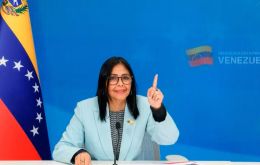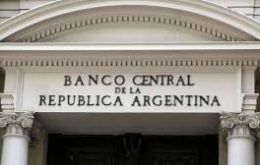MercoPress. South Atlantic News Agency
Tag: IMF
-
Monday, February 23rd 2026 - 04:48 UTC
IMF flags risks of outdated inflation metrics in fast-changing economies

The International Monetary Fund (IMF) is urging countries to modernize how they measure inflation and other key indicators, integrating point-of-sale and online data to reduce “blind spots” that, the institution argues, are widening as the economy becomes more digital and traditional surveys lose accuracy.
Add your comment! -
Monday, January 19th 2026 - 10:36 UTC
IMF keeps Argentina’s growth outlook at 4% for 2026 and 2027 amid fragile global balance

The International Monetary Fund (IMF) has reaffirmed its projections for Argentina’s economy, forecasting growth of 4% in both 2026 and 2027, unchanged from its previous estimates published in October. The figures appear in the latest update of the World Economic Outlook (WEO), presented on Monday in Brussels.
-
Tuesday, January 13th 2026 - 10:00 UTC
IMF coming to Venezuela's rescue?

US Secretary of the Treasury Scott Bessent announced on Monday a plan to stabilize Venezuela’s collapsing currency by re-engaging with global financial institutions. The strategy consists of unfreezing approximately US$4.9 billion in International Monetary Fund (IMF) Special Drawing Rights (SDRs) to provide much-needed liquidity to Caracas' Central Bank.
-
Tuesday, December 16th 2025 - 09:59 UTC
Argentina's Central Bank to loosen up leash on US dollar

Argentina's Central Bank (BCRA) announced Monday a twitch to its foreign exchange policy, which was welcomed by the International Monetary Fund (IMF). The new strategy seeks to further boost reserves and will become effective in January 2026.
-
Monday, October 20th 2025 - 10:01 UTC
Global public debt nearing historic high, IMF finds

The International Monetary Fund (IMF) Fiscal Monitor report warned that global public debt was nearing a historic high, projected to exceed 100% of Gross Domestic Product (GDP) by 2029. In Latin America, the report identified Brazil, Argentina, and Uruguay as the countries with the highest levels of debt.
-
Monday, October 13th 2025 - 10:55 UTC
Milei off to DC for meeting with Trump

Argentine President Javier Milei is due in Washington, D.C., on Monday to meet with President Donald Trump at the White House the following day to ratify a strategic alliance between both countries following the recent financial bailout agreement.
-
Saturday, October 4th 2025 - 10:22 UTC
IMF appoints Daniel Katz as new second-in-command

Following the resignation of Economist Gita Gopinath earlier this year, the Washington-based International Monetary Fund's (IMF) Executive Board announced on Friday that it was hiring Daniel Katz as the new First Deputy Managing Director (FDMD), who is to assume his new duties on Monday.
-
Monday, September 22nd 2025 - 10:34 UTC
Milei postpones trip to US

Argentine President Javier Milei and Economy Minister Luis Toto Caputo have postponed their departure to the United States from Sunday to Monday, it was announced in Buenos Aires. Hence, their meetings with International Monetary Fund (IMF) Managing Director Kristalina Georgieva and other engagements have been rescheduled accordingly.
-
Tuesday, September 16th 2025 - 09:23 UTC
Milei's presence in Paraguay triggers mixed reactions

Argentine President Javier Milei landed in Asunción early Tuesday to participate in the Conservative Political Action Conference (CPAC) and to hold a bilateral meeting with Paraguayan colleague Santiago Peña.
-
Tuesday, August 5th 2025 - 10:00 UTC
IMF money arrives in Buenos Aires, boosting reserves

Argentina has received a US$2 billion disbursement from the International Monetary Fund (IMF), a move that has boosted the country's international reserves and provided a temporary reprieve from exchange rate volatility. The funds, part of an agreement reached in April, have raised the Central Bank's reserves to over US$43 billion, the highest since early 2023.
